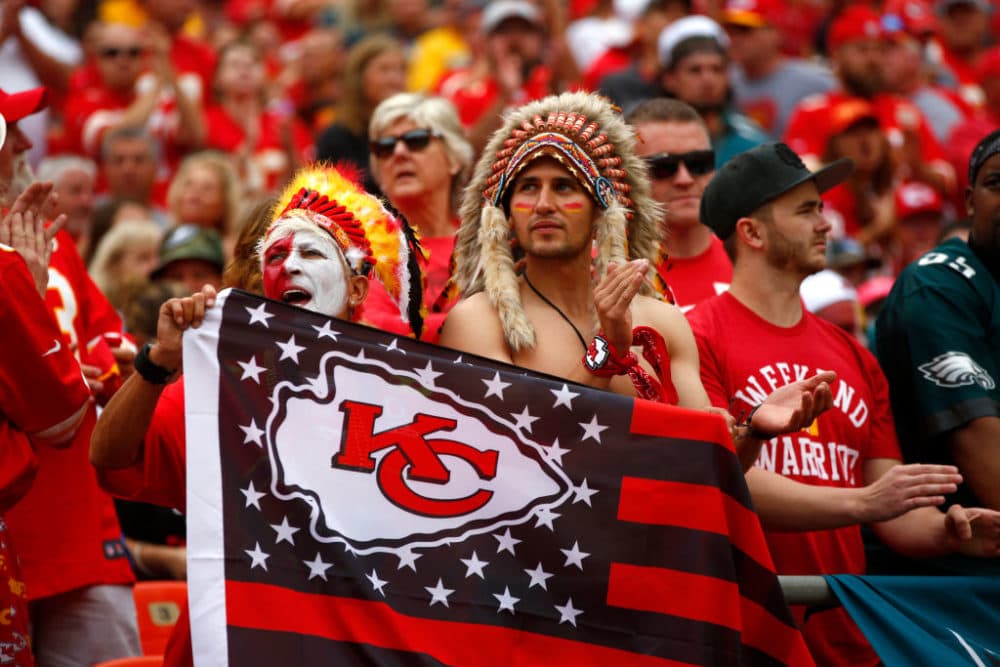Advertisement
At Super Bowl LIV, Questions About Native American Appropriation Take The Field
Resume
Millions of people will be tuning into the 54th annual Super Bowl this Sunday to watch the San Francisco 49ers take on the Kansas City Chiefs for the championship title.
And this year, the big question looming over the field will once again be where the NFL — and the country — stands on the use of Native American imagery in sports.
Native American communities and allies are speaking out against the NFL’s decision to allow Kansas City Chiefs fans to attend the Super Bowl wearing mock headdresses, face paint and performing the so-called “tomahawk chop” chant.
“It's absolutely farcical,” says Vincent Schilling, associate editor of Indian Country Today and member of the Saint Regis Mohawk tribe. “It's stereotypical and it has nothing to do with honoring Native people.”
The world of U.S. sports has grappled with this issue before with the Washington Redskins and Cleveland Indians. Most recently, during the 2019 National League Division Series, St. Louis Cardinals pitcher Ryan Helsley — a member of the Cherokee Nation — called the Atlanta Braves’ “tomahawk chop” chant “disrespectful” and “disappointing.”
The Kansas City Chiefs have sought to address the issue by establishing an American Indian Community Working group, which according to the Chiefs’ website, advises the team on how “to promote an awareness and understanding of Native cultures and tribes in the region.”
“I think anything that tries to encourage, you know, better behavior is a step in the right direction,” Schilling says, “but I feel like it's backpedaling.”
He doesn’t think the Chiefs’ efforts to address their use of Native imagery are serious enough.
“It's very hard when you see something like this and then you see the CEO of the Chiefs wearing a headdress on Instagram saying that he was once voted Cherokee chief for his church group,” he notes.
The photo, which has been removed from Instagram, is yet another reminder of the Chiefs’ imaginary ties to Native cultures.
“It's stereotypical and it has nothing to do with honoring Native people.”
Vincent Schilling
The Kansas City Chiefs’ name is not based on any real indigenous histories, but rather a fictional tribe within the Boy Scouts of America created in 1925 by the would-be Kansas City Mayor Harold Roe Bartle.
When the team came to Kansas City from Dallas, Texas, the team was named after Mayor Bartle’s nickname — “The Chief.”
“There are a lot of people tell me … ‘get over it. We're honoring you,’ ” says Schilling.
But he can’t. For him, it’s personal.
His grandmother was taken from his great-grandmother and placed in a boarding school, where she was cut off from her native community. His great-grandmother, who only spoke Mohawk, was ultimately able to retrieve her daughter back, but as a result of this traumatic experience, Schilling never learned much about his own heritage.
“[My grandmother] couldn't share her language or songs or values or traditions because she was too afraid that I'd be labeled as an Indian boy and be taken to boarding school,” he says. “The honor that my great-grandmother did in taking her daughter back … that is honor to me.”
Growing up without access to his Native culture, the Chiefs fans’ use of mock-Native imagery to essentially celebrate the imaginary “Tribe of Mic-O-Say” is particularly painful for Schilling.
And yet, he still empathizes with fans — Native and non-Native alike — who are trying to reconcile their love of the game and these painful histories.
“You can have excitement for your team … or feel excited about your favorite athletes who have worked so hard to achieve their levels of athleticism,” Schilling says. “But don't tie that into what the meaning of the name is or what the meaning of these stereotypes are because it is not the same thing.”
On Sunday, when the Chiefs take the field in Miami, Schilling doesn’t think there should be a single headdress insight.
“I don't speak for all Native people and I respect their views as well,” he says. “I just personally prefer that they would completely change the name and get rid of all Native imagery in sports, period.”
This segment aired on January 31, 2020.

